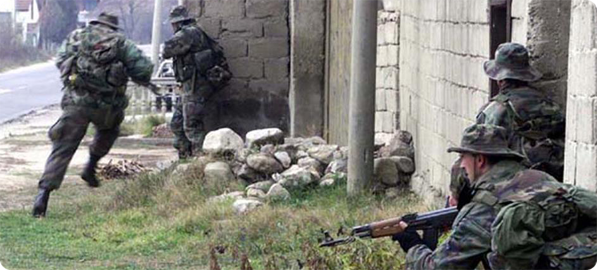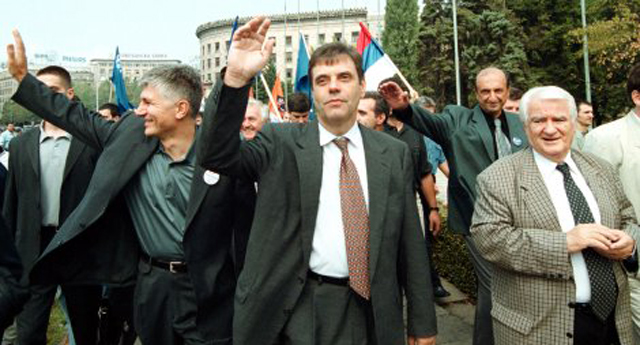Period:
Yugoslav Wars
Region:
Kosovo and Metohia
The Albanian Camp Lapušnik in Kosovo 1998
The Lapušnik (Lapushnik) camp was an Albanian concentration camp under the control of the Kosovo Occupation Army in the late 1990s in the vicinity of Glogovac in the central parts of Kosovo and Metohija, 28 km southwest of Priština.
Most Serbs, non-Albanians, and Albanians as well as members of the Albanian national community who were loyal to the state institutions of the Republic of Serbia, i.e. FR Yugoslavia, were brought to it.
The Lapušnik camp is just one more link in the genocidal series of camps made by the Albanian separatists in Kosovo and Metohija with the goal of ethnic cleansing and extermination of Serbs from their centuries-old hearths.
The exact number of detainees will hardly ever be known, but it is assumed that there were about 50 of them from May to July 1998. The Lapušnik camp was under the jurisdiction of the Drenica group of the so-called KLA (The Occupation Army of Kosovo), and Fatmir Limaj was the camp commander.
All the highest representatives of the Albanian parallel civilian and paramilitary structures in Kosovo and Metohija knew about this death casemate, but they did nothing to close the camp. Only it was done when strong military and armed forces came to that area.
In addition to this camp, there were camps in: Likovac, Glođan, Klečka, Ovčarevo, Trpeza, and Zočište… According to the Association of Kosmet victims, there were at least 144 camps in the territory of Kosovo and Metohija in the period 1997-2000, with imprisoned Serbs, Roma, and (dis)loyal Albanians.
The Hague Tribunal refused to prosecute all those responsible although the War Crimes Prosecutor’s Office in Belgrade submitted comprehensive documentation. Three of them were charged, and only one was convicted.
BACKGROUND
On On 15 January 1999, in the Kosovo village of Račak, Serbian police clashed with Albanian terrorists. The Western Media falsely reported that Serbian policemen killed Albanian civilians. They were instructed by William Walker, the head of the Kosovo Verification Mission.

Holbrooke in Belgrade with false offer
This case served as justification for the aggression and bombing of Serbia and Montenegro in 1999, which the Government of Serbia attempted to avoid in negotiations with Kosovo Albanians in Rambouillet. As this attempt failed, American general Wesley Clark ordered the bombing, which turned into genocidal action known as “Merciful Angel.”
ESTABLISHMENT OF THE CAMP
The camp in Lapušnik was established in mid-May 1998 when fierce fighting was already going on between Albanian terrorist forces and police units of the Republic of Serbia, which were sent to defeat Albanian terrorists and restore peace and normal traffic in that part of the southern Serbian province.
Lapušnik is a village in the municipality of Glogovac, 28 km southwest from Priština, the capital of the Autonomous Province of Kosovo and Metohija. This is an important place due to its geostrategic position in the heart of Kosmet, more precisely, on the four borders of the Prizren, Peć, Priština, and Kosovska Mitrovica districts.
The command of the Drenica group of the so-called KLA had decided to establish a camp for civilians, not only Serbs, but also Roma, as well as other non-Albanians, and Albanians loyal to the country they live in.
Lapušnik is a settlement that, according to the 1991 census, had about 3,100 inhabitants, mostly of Albanian nationality.
CAMP OPERATION
The Albanian camp in Lapušnik had harsh conditions, where camp guards often beat and tortured innocent civilians. In addition to beatings, which were a daily occurrence, the victims often had their limbs (arms, legs), ears cut off; their hair was burnt, they were forced to sleep on concrete floor or earth, etc.
Most of the detainees were from the territory of the municipalities: Glogovac, Štimlje, and Lipljan.

Kidnapped Serbs that were taken from Kosovo
to the Republic of Albania
The food in the camp was poor and insufficient, and there was no health care. The detainees often received portions without knowing what they were eating.
The estimate of the people that researched the camps in Kosovo and Metohija is that during the two months of its existence, around 50 Serbs, Roma, non-Albanians, etc. were detained in the Lapušnik camp; more than 65% of them were killed or taken to the town of Burrell in the Republic of Albania to a special camp “The Yellow House” where their organs were harvested and later sold across Europe through Italy on the black market.
All Albanian parallel authorities in Kosovo and Metohija were well aware of the existence of not only the Lapušnik camp but also of the other 144 casemates that existed in that area from 1997 to 2000. However, nothing has been done to stop the monstrous crimes.
NAMES OF TORTURERS
The persons recognized by the victims themselves, and later confirmed during the investigation, are:
Fatmir Limaj, a senior officer of the Occupation Army of Kosovo (KLA), a member of the Drenica group, was the camp commander. He was born on 4 February 1971 in Banja, Suva Reka municipality, Kosovo, and Metohija.
Haradin Bala, a member of the Drenica group of the Occupation Army of Kosovo, was a guard in the camp. He was born on 10 June 1957 in Koretica, Glogovac municipality, Kosovo and Metohija. He killed three prisoners in the camp, and more of them later in the woods during an escape.
Isak Musliu, a member of the Drenica group of the Occupation Army of Kosovo, was the deputy commander of the camp. He was born on 31 October 1970 in Račak, Štimlje municipality, Kosovo and Metohija.
Agim Murtezi, member of the Occupation Army of Kosovo.

Criminals with a pedigree: Fatmir Limaj, Sylejman Selimi, Sahit Jashari, and Sami Lushtaku
CLOSING OF THE CAMP
At the end of July, members of the Ministry of Interior Affairs of the Republic of Serbia started the action of liberating Glogovac and its surroundings, since they knew there were strong terrorist forces of Albanian separatists who had a criminal mission in that part of Kosovo and Metohija.
On 25 July 1998, after two days of fierce fighting, police forces managed to defeat the terrorists who retreated in a mess and took about 15 prisoners with them. Most of them were killed in the woods, and a smaller part managed to escape.

Special police forces in the military action of liberating Glogovac
TRIALS AND JUDGMENTS
At the beginning of the 21st century, the International Tribunal for Former Yugoslavia began the trial of several guards and the commander of the Lapušnik camp.
On 27 January 2003, the Hague Tribunal indicted Fatmir Limaj, Haradin Bala and Isak Musliu. In February 2003, they were arrested by KFOR and the Slovenian police and were immediately taken to the Scheveningen (Netherlands) detention units.
The trial lasted one year from 15 November 2004 to 30 November 2005. The verdict of the Chamber of the Court read: one sentenced to 13 years in prison, Haradin Bala, for murder, torture, inhuman treatment of prisoners. Fatmir Limaj and Isak Musliu were acquitted of all charges and released home.
On 27 September 2007, the Appeal Chamber of the Hague Tribunal upheld the judgment of the Trial Chamber. So, Haradin Bala was sent to serve his sentence in France.
From there, he was prematurely released on 28 June 2012 for inexplicable reasons. Haradin Bala died on 30 January 2018 at his home, and he remained the only Albanian terrorist convicted by the Hague Tribunal.
YEARS LATER
When the fighting in Kosovo and Metohija ended in June 1999 after the Military Technical Agreement had been signed in Kumanovo, the Yugoslav security organs withdrew: the Army, the Police, as well as state institutions. That caused the mass exodus of hundreds of thousands of Kosmet Serbs.
At the beginning of October 2000, there was a change in the political power, when Zoran Đinđić, and later Vojislav Koštunica, formed the government. They made a radical turn in the foreign policy of our country, i.e. it was the policy of Euro-Atlantic integrations.

Serbian "democratic" politicians in Belgrade
Under these conditions, more than 2100 Albanian criminals were released from Serbian state prisons. They had been sentenced to many years in prison for serious criminal offenses: murders, tortures, rapes, robbery, etc. They did not ask the Albanian party to release Serb civilians from Albanian camps.
The fate of more than 1,647 Serbs from Kosovo and Metohija is still unknown.
PUBLICATIONS
No documentary about the Lapušnik camp has been filmed so far, nor has any book been written that would testify about the horrors of the casemates that Serbs and non-Albanians went through.
Veselin P. Dželetović wrote the book “Srpsko srce Johanovo” which is mostly about the Yellow House camp. The book has been reprinted several times and translated into many languages.
Tags:
|
|
|
|
|
|
|
|
|
|
|
|
|
|
|
|
|
OCCUPATION ARMY OF KOSOVO
|
|
Please, vote for this article:
Visited: 3549 point
Number of votes: 18
|